Resources for supporting young people into work
Employability and The needs of young People
Since 2017 Devon Communities Together have been working with many different organisations which support young people, primarily aged 16 to 25, across Devon. Most notably through three projects, Empowering Enterprise, Experience Works and Innovation for Youth and Community (please click each of the above links for project specifics).
In this time we have worked with youth workers and mentors, employers and volunteering providers, and young people themselves. We have better understood the needs and circumstances of young people, as well as practical approaches employers and others can follow to give young people the best support.
This page talks through some of the context and principles for supporting young people and, at the bottom of the page, gathers together some resources gained across these projects.
Below Russell from iOutlet gives his tips on hiring and supporting young people with less education or experience
I've learnt you've got to make [the recruitment process] much more informal and open-ended. . . . [young people] just need to have the attitude to show you want to learn and want to improve . . . [you want to] make sure the candidate knows about the job as much as we want to know about them. So it has to be a more open ended conversation."
Young people's context
There are approximately 11,000 young people Not in Education, Employment or Training (NEET) in Devon today, and from the cost-of-living crisis and soaring housing prices to the ongoing impacts from the Covid-19 pandemic (like disruption to education and increased mental health issues) young people in Devon and beyond are facing a number of challenges. Worryingly, in 2022/23, the Empowering Enterprise project saw the number of participants experiencing homelessness double, from 7% to 14%.
The Prince’s Trust Annual 2022 Youth Index found that almost half of all young people who are Not in Education, Employment or Training (NEET) said being unemployed made them feel helpless and 38% of NEET young people said struggling to find work makes them feel lonely. The Prince’s Trust Class of Covid report found 49% of young people feel anxious about the future on a daily basis. This picture is reflected in the stories from Empowering Enterprise, with participants feeling stuck and some reporting staying in their rooms “24/7”. One participant Dee, who lives in rural Dartmoor with her young daughter, was very isolated and living with high anxiety. Working with her mentor helped her grow in confidence, access distance learning courses and Dee is now an aspiring social worker.
Young people may be facing many significant barriers, such as traumatic histories, addictions or little or no qualifications, but we witnessed that underpinning these barriers young people are often very low in confidence with high levels of social anxiety.
Of course, young people lacking in confidence and purpose also affects wider society. Choosing to hire and support those who have had previous challenges can bring huge benefits such as:
- Loyalty and enthusiasm to an employer who gives them a chance
- Brand recognition and a positive local reputation
- Tapping into a massive pool of overlooked resource and potential
- Diverse perspectives and an understanding of todays technologies and world views
what support works?
The projects we have worked on have achieved great successes with thousands of young NEETs in Devon by pairing each young person with a one-to-one mentor, who supported participants to not only secure employment or educational outcomes, but also to develop life skills and ultimately lead more empowered lives.
It became clear that participants would usually need support with life skills before they were able to pursue other education or employment results. Whether supporting someone to get on a bus, order a coffee, manage their spending, navigate support services or spend time in groups with their peers, trusting and supportive mentoring relationships allowed young people to take small steps which contributed to wider wellbeing and self-belief.
Lockdowns have had a huge impact on young people's belief in opportunity . . .mentors are altering the perception that there is 'non way forward' and helping with the softer, more invisible outcomes. Such as improved anxiety, being able to travel independently or improved anxiety" Empowering Enterprise Mentor
However you are involved with young people, whether as an employer, prospective employer, friend or family member - the ability to be a supportive and positive presence is often life changing.
For more inspirational videos of young people changing their lives with the support of mentors, and stories of employers initiatives and approaches visit our YouTube pages.
Positive Organisational approaches
Of course the ability for young people to thrive is not only related to their confidence, but the way the world around them is set up and managed. Through our involvement in projects we found some key actions which are generalised below. These points cover a range of involvements and where applicable can make young people feel more confident and motivated to access and contribute to support services, volunteering opportunities and workplaces.
- Expectation management is key for any form of placement or interaction. Having 'trailer' type videos or brochures with images of your service/workspace/team members for people to look at can help with feelings of intimidation. For example, are suits and smart clothing common or a more relaxed atmosphere? Suits can have negative connotations for some, especially care leavers. Or is it ok to have the camera off on a video call, such as in a whole class lesson or a call with a health professional? Many people may feel less pressurised and be more confident to contribute via the chat box or by microphone with their video off.
- At an induction, or before, clearly explain what is expected of the person, and listen to what they expect, try to ensure a level of realism and outline how their involvement with you is one step in a larger journey. Consider 'formalising' this as a 'learning agreement'. Use of simple tickboxes can aid this conversation. Return to these conversations throughout involvement with a young person to reflect on progress, build confidence, and draw out the skills they may not realise they have.
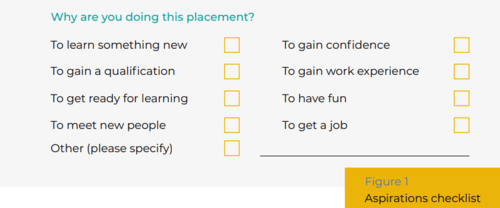
- Consider including very clear travel instructions, as independent travel is a large barrier for many young people both due to the potential anxiety it can cause, and the practical concerns of cost and insufficient transport routes.
- In induction processes resist introducing too many people all at once, this can be very overwhelming, and a real challenge for people to present themselves to multiple people. Instead establish the key staff who will be supporting them for the first days/weeks, and don't be afraid to learn the individuals wider circumstances as these may be areas which need to be addressed.
- Employers, generally, don't appreciate the very valuable role of 'bite size' work experience such as taster days, mock interviews, shadow shifts and work place visits in setting expectations of your organisation, but also your sector or the world of work in general. These are highly beneficial for participants taking their first steps to overcome barriers and move towards work – and require little risk or commitment from employers.
- If aiming to gain the input and support of young people to contribute to your organisation, for example via consultation or as 'young trustees', focus on the relationships and social side rather than the insights. Make sure the young people involved feel valued and heard. This means prioritising conversation and enjoyable environments rather than relying on methods such as surveys. Organising the discussions in a setting where movement is possible, rather than formal sit down type settings, is usually helpful.
- If arranging volunteering or 'consultation' type activities, make sure young people know what is 'in it for them!'. 'Experience' is often not appealing in and of itself, and it helps to provide tangible benefits as much as possible, such as a certificate of completion, credits towards a qualification, and/or enjoyable refreshements.
- Different organisations will have different roles in a young persons life, but when thinking about the staff and training needs necessary to support young people in your organisation it is helpful to think of a broad range of knowledge areas. As young people are finding their feet after a period of low confidence or instability, it can be common for one challenge to give way to another and broad support is helpful. For example, challenges with the benefits system, housing, drugs and alcohol or gender identities may all arise. A foundational knowledge of Mental Health First Aid and Safeguarding are important and to most importantly to prioritise personality traits such as genuine kindness, curiosity, patience and determination.
Resources
Below are resources where you can delve deeper into some insights and best practice approaches for working with young people, employers and support services. They include case studies, printable forms and templates, links to valuable support agencies and much more.
Heather, owner of, Saddles and Paddles in exeter shares her tips for when applying for a job
dCT's Freya and Simon go into detail on some of the practices employers can adopt to help young people, especially those with high anxiety, suceed in the workplace
Inclusivity Resources For Supporting Young People
-
Useful linksDirectory of Devon based and national organisations
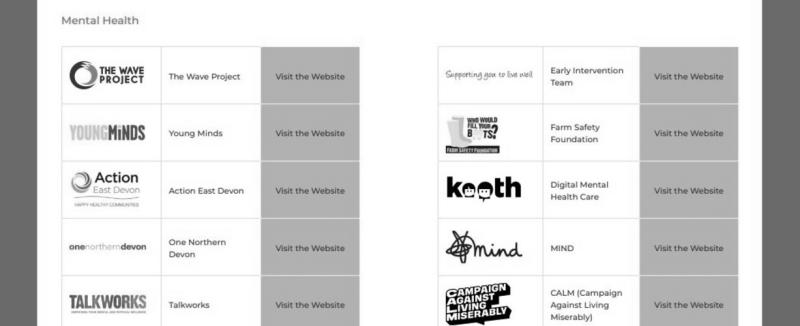
-
Inclusive Employment ToolkitTips and context on inclusivity
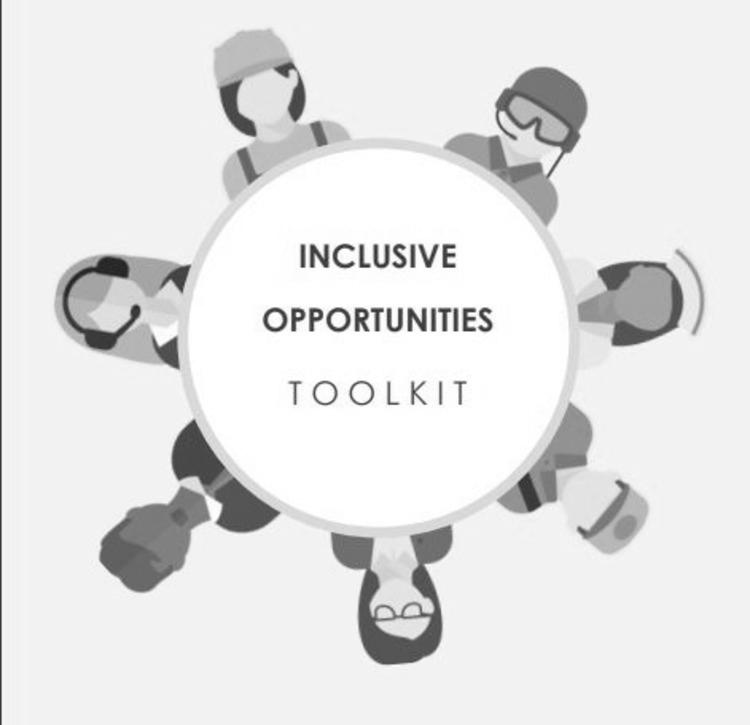
-
Inclusive LanguageAdvice and examples for conversation
-
Needs of rural young people and youth workers
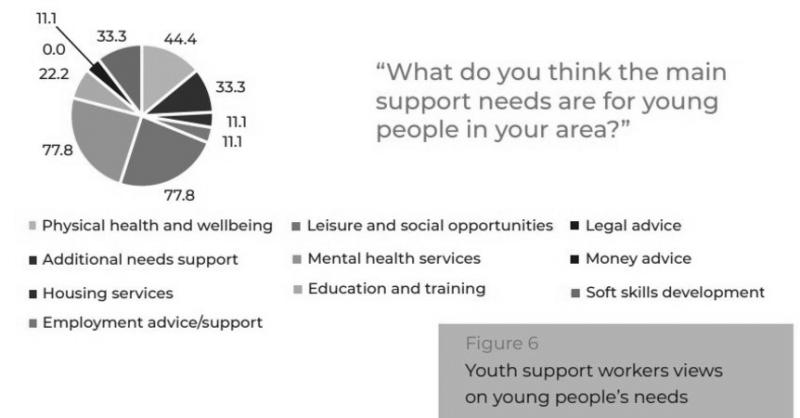
-
LGBTQ+ LanguageAdvice and tips on gender and sexuality
-
A guide to working with autistic individuals
-
Advice for contacting employers
-
Involving young people in initiatives
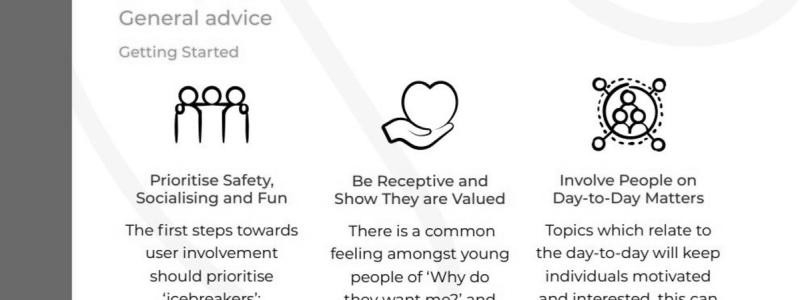
-
Facilitating youth volunteering and work placements
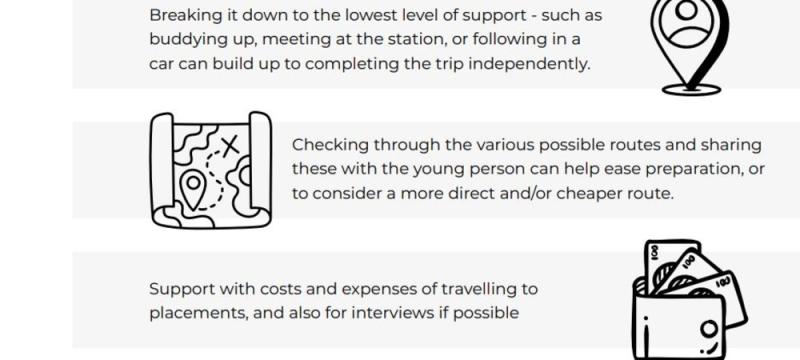
-
Navigating support services
-
Insight tool: Young people in rural communities

